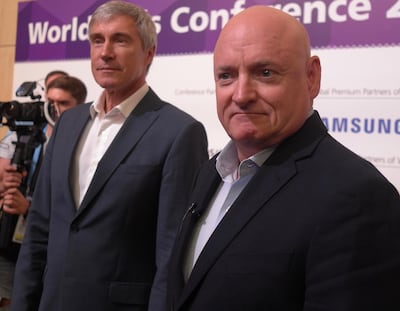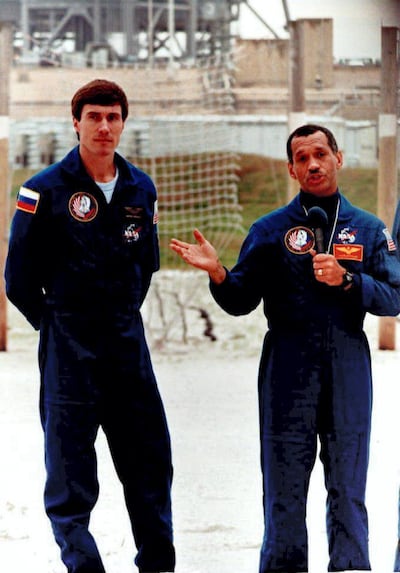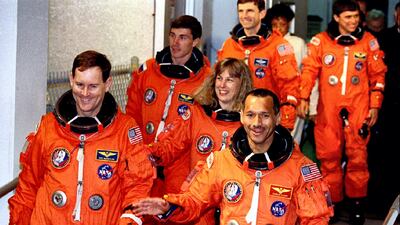With Maj Hazza Al Mansouri poised to become the first Emirati in space, who better to offer advice on what he might expect than two of the world’s most experienced astronauts?
Russia's Sergei Krikalev and American Scott Kelly have made 10 flights between them and spent more than 1,000 days on the International Space Station, notching up an impressive series of endurance records.
Even though it was nearly 20 years ago, Mr Kelly, 55, still vividly recalls his first flight on the Space Shuttle Discovery.
"Launching into space, especially for the first time, is probably the first real moment you have ever experienced in your life," he says.
“No matter how much it’s been described to you, how much your instructors or other people who have flown have tried to explain to you what the first few seconds are like, you really have no idea.”
Leaving Earth for space, he says, "is just the wildest ride of your life".
Mr Kelly's four trips into space include two on a Russian Soyuz rocket.
In March 2015, he headed to the ISS from the Baikonur Cosmodrome and did not return until March the following year.
He later wrote about the experience in the bestselling book Endurance: A Year in Space, A Lifetime of Discovery as well as appearing in an Emmy-award-winning TV documentary.
Joining him then was another Russian astronaut, Mikhail Kornienko, as part of an experiment to measure the effects of long-term space flight on the human body.
For Mr Kelly, the experience left him with measurable, but not serious, changes to his DNA and eyesight.
After being in zero gravity for so long he stretched 5 centimetres, he says.
Although Mr Kelly never flew to space with Mr Krikalev, the two astronauts are old acquaintances, meeting again last month to speak at WorldSkill Kazan 2019, the international vocation skills competition that was held in Abu Dhabi in 2017.
At 61, Mr Krikalev is the older of the two, and after retiring as a cosmonaut, is now the executive director of human space flight at the Russian space agency Roscosmos and a holder of the Hero of the Russian Federation award.
His six space missions began under the Soviet Union in 1988 with a trip to the Mir space station.
Two flights on Nasa’s Space Shuttle were followed by trips to the ISS on Soyuz craft.
His 803 days, nine hours and 39 minutes in orbit are the third longest of any human being and have earned him an unusual record.
His advice for a first-timer is practical.

“The simplest advice would be to do what you’re trained to,” he says. “Don’t do something strange, and be able to do what you trained for, because when you get in a stressful environment sometimes people get distracted. That’s why people do all this training for being in space.”
Both men underwent the extensive training that Maj Al Mansouri, and his back-up Sultan Al Neyadi, will now be familiar with.
It included being left to fend for themselves in the Russian wilderness as well as gaining survival techniques in case their return capsule went off course and a rescue mission took several days.
"All our training is done to build our skills – how to build a shelter, how to make a fire, how basically to survive in a situation when it's not easy," Mr Krikalev says.
“The only thing we have is what we have in the capsule. We’re not equipped specifically for camping – we are equipped to go into space.
“But we have to have skills to survive before rescue forces come to pick you up.”
As for life on the International Space Station, it involves more than only being an astronaut or a scientist, Mr Kelly says.
“There’s the technical skills, which are being an engineer, a scientist, maybe a pilot, but also these other skills which you might not even think an astronaut has to have.

“But if you consider the fact we are on this orbiting laboratory and something breaks, then you can’t call the repair man.
“So you are the plumber, you’re the IT person, the electrician, the doctor, the dentist. I’ve actually done dentistry more than once.”
Mr Krikalev agrees: “You have to able to do everything – the water supply system, the electrical system, including soldering if you want to repair something.
“It’s very interesting to be very diversified in your skills, which allows you to stay in space for a long time with a small crew.”
Their training allows them to perform optimally.
"Even if you are not very comfortable during space flight – especially in the beginning, when you are in weightlessness you may have motion sickness, blood shifting in your body – you can keep focusing on what you are doing," Mr Krikalev says.
Maj Al Mansouri will spend eight days on the ISS on his pioneering mission, returning on October 3, although future flights by members of the UAE's astronaut corps will certainly be longer.
He will have a "baggage allowance" of 10 kilograms of cargo, including experiments, a UAE flag and a photograph of Sheikh Zayed, the Founding Father.
Also coming along for the ride are dishes for Emirati meals he will host, including salona chicken stew, the pounded meat and rice dish madrouba, and balaleet, sweetened vermicelli served with an omelette, for breakfast.
Mr Kelly has some final words of advice. “Expect the unexpected. I don’t think there’s much more you can tell people,” he says. “When there’s a new astronaut flying I say enjoy yourself and take a lot of pictures. Rest, pace yourself – and be careful!”


